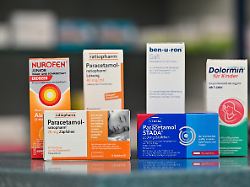“Don’t be idle”
Bavaria plans drug strategy
9/2/2023 5:19 am
There is a shortage of many medicines in Germany. The Federal Minister of Health, the Federal Institute for Drugs, and many pharmacists are currently warning of a tense supply situation. Bavaria therefore wants to work out countermeasures with several states.
In view of the impending bottlenecks in the supply of medicines, Bavaria wants to discuss joint steps with three other states. A “south rail conference” is planned for September 11 in Munich, said Bavaria’s Health Minister Klaus Holetschek. The health and economics ministers of Baden-Württemberg, Rhineland-Palatinate and Hesse have been invited.
“The federal government is threatening to miss an important time window for the supply of medicines this winter,” said Holetschek. “The same applies to the necessary guarantee of the supply of medical devices.” As long as there is a nationwide shortage of antibiotics and cancer drugs, Germany “should not be idle”. That’s why he wants to “discuss necessary measures” with the ministers from the three countries.
Federal Health Minister Karl Lauterbach had previously urged increased precautions due to possible new bottlenecks in children’s medicines in the approaching cold season. In the coming autumn and winter, “a tense supply situation” could arise for important antibiotics and other relevant agents, he wrote in a letter to the pharmaceutical wholesale association at the end of August. On Thursday, the Federal Institute for Drugs and Medical Devices published an “urgency list” with a good 30 children’s preparations that have the highest priority.
Antibiotics, suppositories, juices
Lauterbach asked to intensify their procurement. The list includes several antibiotics, nose drops, fever-reducing and pain-relieving juices and suppositories, among others. Lauterbach asked the pharmaceutical industry for estimates of the available quantities and the costs “for urgent procurement and storage until the beginning of the infection season”. If wholesalers incur additional costs for the implementation of this “extraordinarily urgent measure”, the ministry will examine counter-financing. At the beginning of August, doctors and pharmaceutical retailers warned of new drug shortages in autumn and winter.
“It is to be feared that if there are high waves of infection like last year, parents will have to walk halfway through the city to get fever syrup or antibiotics,” said Thomas Fischbach, President of the Professional Association of Pediatricians (BVKJ), who ” New Osnabrück newspaper”. The associations of pharmacists and pharmaceutical wholesalers also considered further bottlenecks to be possible. After a wave of infections last fall, bottlenecks in children’s medicines such as fever and cough syrups escalated. There had also been problems with cancer drugs and antibiotics.
The federal government reacted with new regulations. The law, passed in July, makes stocks of several months’ quantity for frequently used medicines mandatory. Price rules are to be relaxed so that deliveries to Germany are more worthwhile for manufacturers. BVKJ President Fischbach said, however, that the reform “will definitely not help through this winter and may fall short in the long run”. Drug shortages also paralyzed the practices in some cases because employees had to go to a number of pharmacies on the phone to find the drugs they needed. “We are therefore looking forward to autumn and winter with concern.”
